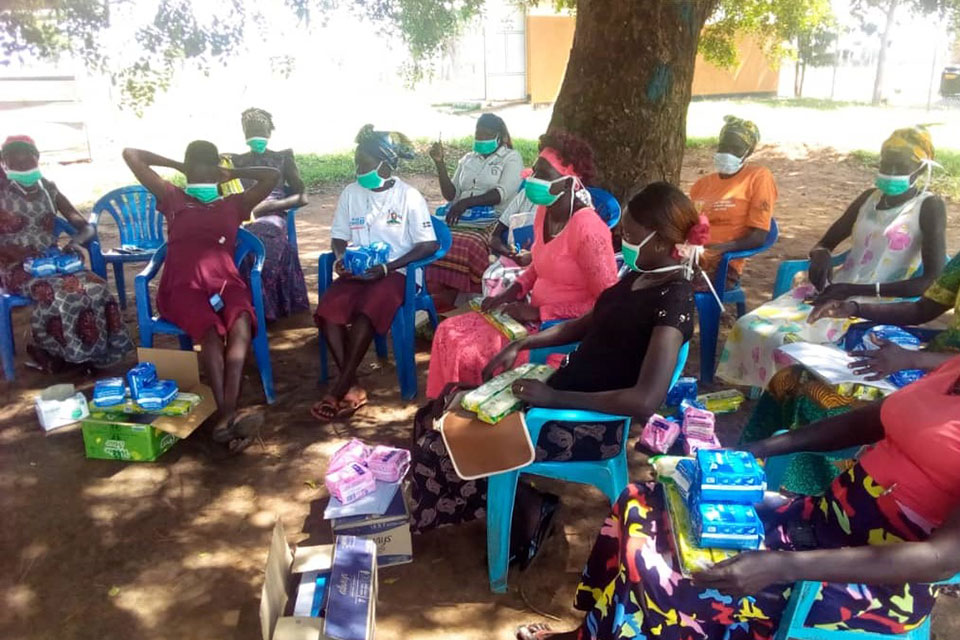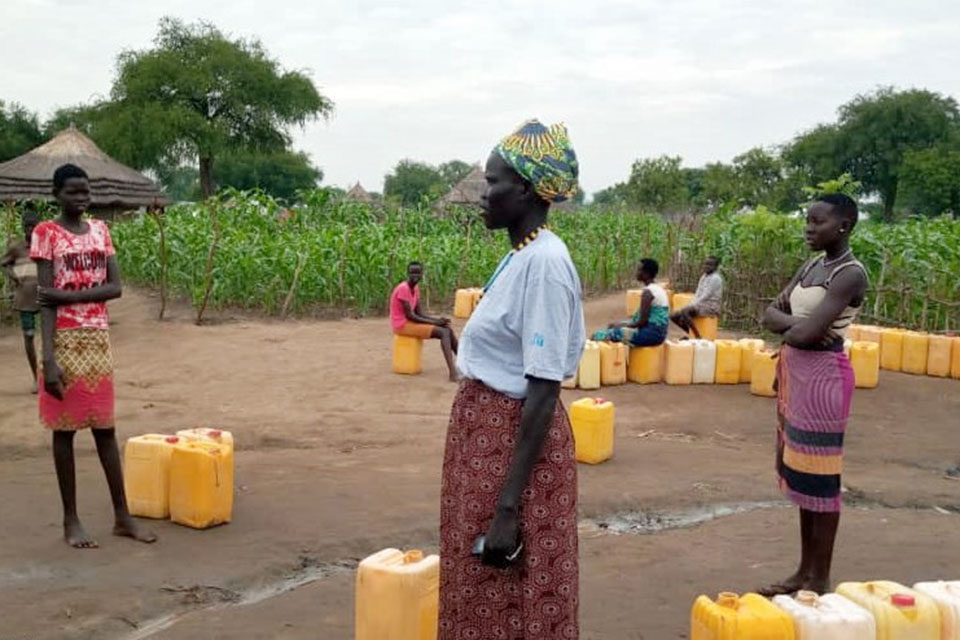UN Women Promotes Women's Participation as key Actors on the Front lines of COVID-19 Prevention in Refugee Settlements in Uganda
Date:

By 9:00 a.m., the morning sun already feels hot in the Bidibidi settlement for refugees and displaced persons, located in the Yumbe District of Uganda. A steady file of women gathers around a borehole to collect water. They will repeat this chore again in the evening.
Forty-year -old Joyce Maka waits for more women to arrive at the water collection point. The mother of three is a refugee herself; she arrived from South Sudan in 2018, after the rebels had killed her husband. Today, she is among 12 women peace mediators in Zone 2 of the Bidibidi Settlement, and she is here to raise awareness about prevention and health safety measures to combat COVID-19 – the disease that has wreaked havoc on people’s lives and economies globally.
People living in refugee settlements are especially vulnerable to the ravages of the disease, as they live in cramped quarters with few basic services and health care systems can get overwhelmed very quickly.
The lockdown measures that have left many people confined to their homes as a way of reducing the spread of COVID- 19, make information dissemination a challenge in these areas. Maka says the water collection points still draw people – usually women and girls – in large numbers – and hence these are strategic points to pass on life-saving information.
“We encourage them to stay at least two metres away from each other; we also encourage them to wash their hands before and after pumping water,” she explains.
As the number of COVID-19 cases in Uganda continues to rise, women peace mediators, who resolve community disputes and challenges, have joined the fight against the pandemic in refugee settlements in the districts of Yumbe and Adjumani, bordering South Sudan and the Democratic Republic of Congo. As of 9 June, Uganda has recorded 646 infections.
UN Women’s project, in partnership with the Women International Peace Centre, and funded by the Government of Norway, has trained and supported 160 women peace mediators in Yumbe, Adjumani and Kotido districts. While their work usually involves mediating community disputes, including domestic violence, early marriages and land rights issues, the project pivoted to sensitize them on COVID-19 prevention measures. They have learned about the importance of hand washing, physical distancing, wearing masks and reporting new settlers so that they can be tested and quarantined. UN Women has also provided masks, soaps and sanitary pads for their own personal protection and hygiene.
UN Women’s Programme Management Specialist, Yusrah Nagujja says, “We wanted to make sure that women peace mediators are safe from COVID-19. We encourage them to take necessary precautions, not to put their lives, families and the general community at risk.”
In the Nyumazi settlement in Adjumani District, the mediators are targeting food distribution points to pass on information on COVID-19. They also meet people on the streets to have one-on-one conversations, making sure that every household has a hand washing point, clean racks to store utensils and access to toilets.

Martha Achok, a peace mediator from Nyumazi explains that COVID-19 prevention work can be particularly challenging in refugee settlements: “It’s a bit tricky to tell someone to wash their hands using soap [repeatedly], when she has spent weeks without washing clothes because of lack of soap. We still advise because hand washing is also a behavioural change issue.” Even when there is soap available, one may need to cultivate the habit of frequent hand washing.
In Bidibidi, the mediators have composed songs in the local dialect to pass on the messages – a communication method that resonates with the residents.
Achok has already seen some success in raising awareness. Most of the current COVID-19 cases in the settlements involve new settlers. The communities are now more vigilant about identifying newcomers to ensure that they are tested and quarantined first, which has helped control further spread of the disease.
Mary Aemo, field officer with Women International Peace Centre in Yumbe District stresses that gaining trust and cooperation of the community is key to successful prevention of the spread of COVID-19, and the mediators are trusted members of the community. “Majority of the people are positive about reporting relatives who are coming from South Sudan. One of the peace mediators reported her own husband who had returned from South Sudan. He was tested and quarantined, and the results returned positive for COVID-19.”
UN Women’s programme in Uganda offers practical examples of how to apply UN Security Council resolution 1325, which calls for women’s meaningful participation and leadership in peacebuilding, in development and humanitarian settings. At the end of the day, for sustainable peace and effective crisis management, it is not enough to cater to women’s needs; it is equally vital to engage them as leaders in shaping actions and decisions in their own communities.